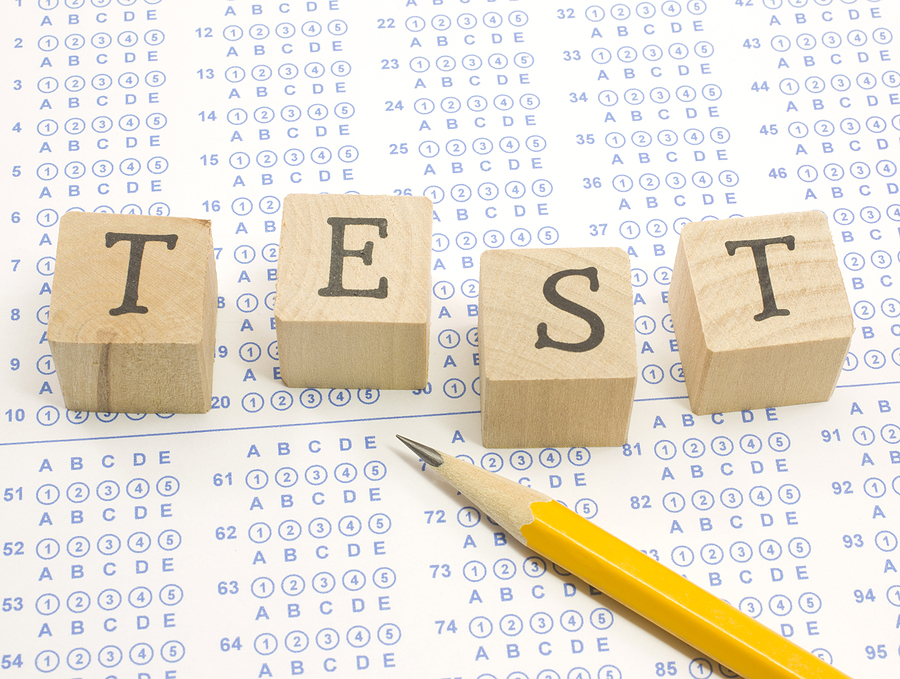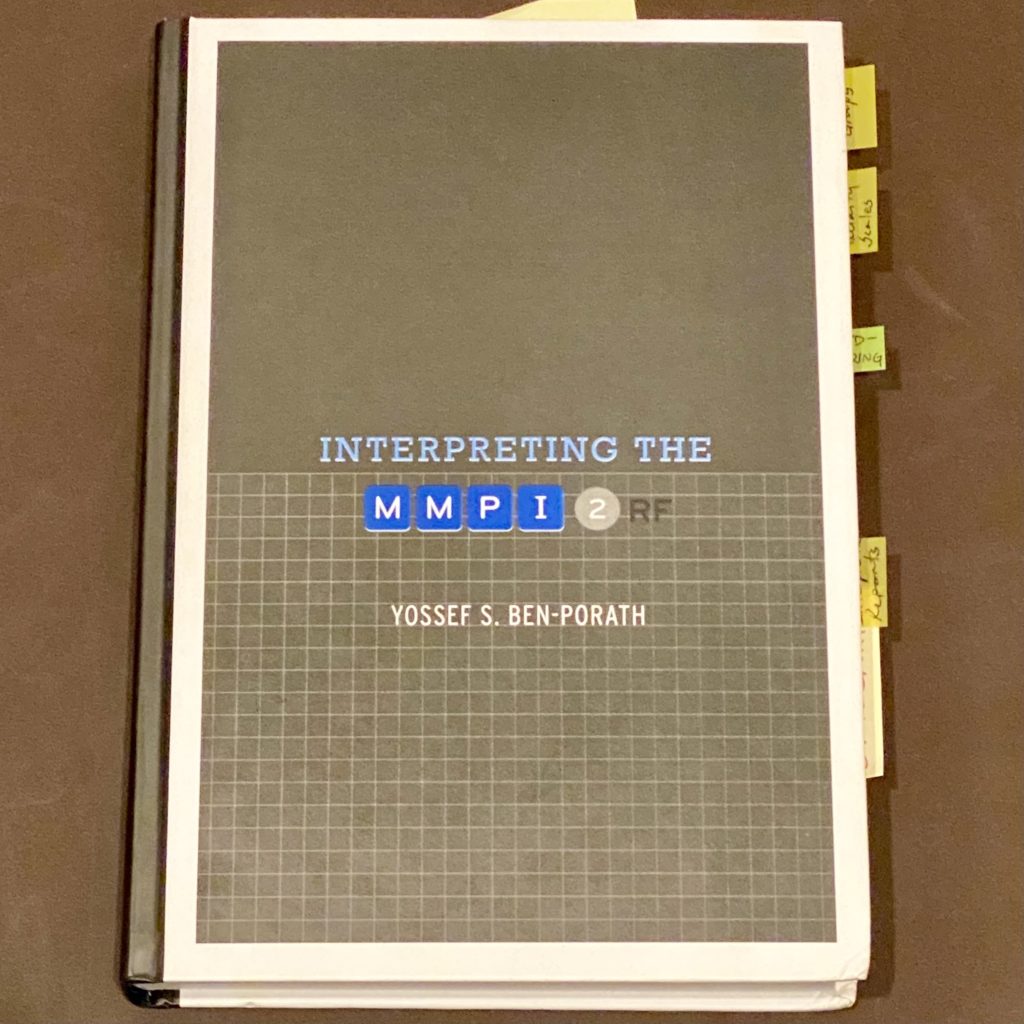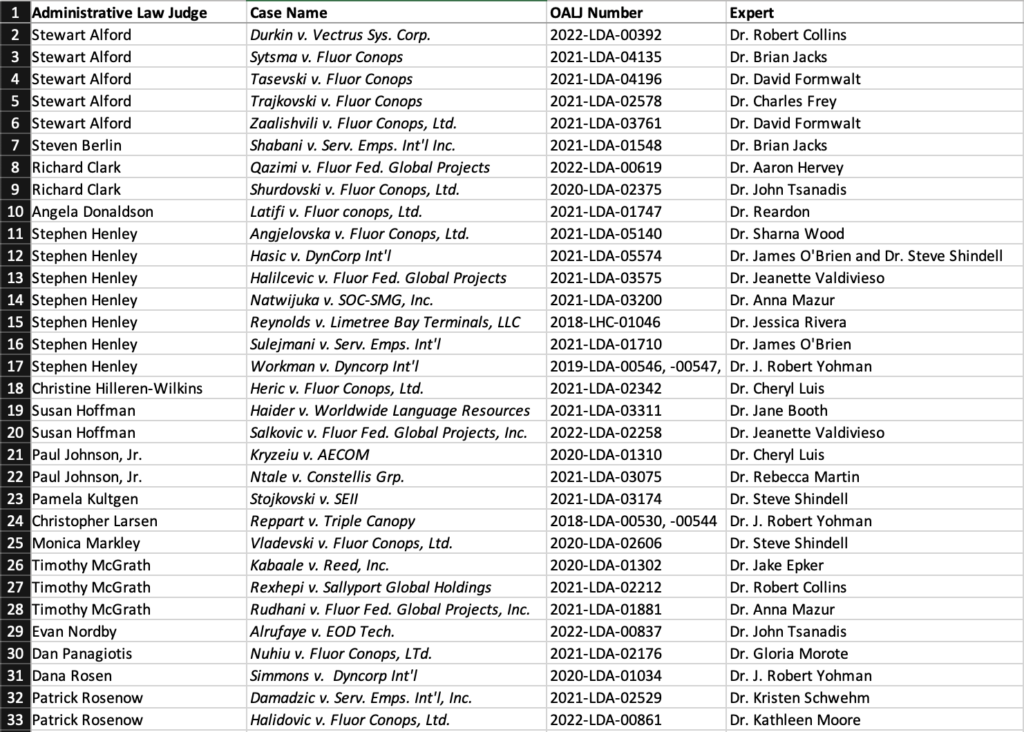The Importance of Psychological Test Data Disclosure in Defense Base Act Claims.
Many Defense Base Act (“DBA”) claims feature mental health injuries. Often, the DBA insurance carrier schedules the injured worker for a defense medical examination (“DME”) with a mental health expert. The carrier’s expert might administer psychological tests to the claimant. This post answers a simple question:
Must mental health experts produce psychological test data in the discovery process?
Unsurprisingly, they must. There is no doubt that test data is discoverable in a DBA case. If the expert relied on the psychological test data when preparing their report, then that test data may be discovered.
Still, we constantly address objections to test data discovery requests–even when the claimant sends the expert a written, signed release authorizing test data disclosure and a subpoena. Over the past few years, the constant objections have produced substantial litigation, and many Office of Administrative Law Judges (“OALJ”) orders addressing test data discovery.
Below, I address the test data issue, starting with the ethical rules that expressly allow production. Next, I explain why the test data production is needed for effective cross-examination. Finally, and perhaps most importantly, I provide a case review of all orders I could locate on the OALJ’s website where current judges addressed the discoverability of test data.
Apples and Oranges: Defining “Test Data” and “Test Materials”
Often, defense experts incorrectly justify their refusal to disclose test data by claiming an ethical prohibition. In making this claim, defense experts conflate test data and test materials. Although these terms sound quite similar, they are in actuality completely different things. Claimants seek test data so their attorneys can cross-examine defense experts about their opinions and reports. By arguing that apples are oranges, defense experts obstruct the discovery process and needlessly draw out litigation.
What is Test Data?
Ethical Standard 9.04 of the American Psychological Association’s Ethical Principles of Psychologists and Code of Conduct defines “test data” as follows:
The term test data refers to raw and scaled scores, client/patient responses to test questions or stimuli, and psychologists’ notes and recordings concerning client/patient statements and behavior during an examination. Those portions of test materials that include client/patient responses are included in the definition of test data. Pursuant to a client/patient release, psychologists provide test data to the client/patient or other persons identified in the release.
Based on the APA’s ethical guidelines, evaluators must provide the following information upon receipt of a client request or a court order:
- Raw scores
- Scaled scores
- Claimant responses to test questions
- Claimant responses to stimuli
- The examiner’s notes regarding claimant-made statements
- The examiner’s notes regarding claimant behavior
- Portions of test materials that include claimant responses.
What Are Test Materials?
The term “test materials” is different than the term “test data.” Ethical Standard 9.11 of the APA’s Ethical Principles defines “test materials” as follows:
The term test materials refers to manuals, instruments, protocols, and test questions or stimuli and does not include test data as defined in Standard 9.04, Release of Test Data. Psychologists make reasonable efforts to maintain the integrity and security of test materials and other assessment techniques consistent with law and contractual obligations, and in a manner that permits adherence to the Ethics Code.
The APA’s definition of “test materials” establishes that “test data” and “test materials” are different things. Whereas “test data” refers to a claimant’s tests scores, responses, notes, and even test materials that include a patient’s response, “test materials” refers to the test documents itself. The “reasonable” protection suggested in the definition of “test materials” in no way prohibits the disclosure of “test data.” And “reasonable” protection does not mean complete exclusion of production.
In fact, many states require disclosure of “test data” upon receipt of a client or patient request. For example, Section 465.22 of the Texas State Board of Examiners of Psychologists’ Rules of Practice says: “Test data are part of a patient’s records and must be released to the patient as part of the patient’s records.”
Why Test Data is Important for Lawyers and Claimants?
Disclosure of test data is essential for effective cross-examination.
Sometimes, experts misstate test results. An expert’s report might say that a claimant failed a particular psychological test. Yet, test data reveals that the claimant actually passed.
Other times, experts misstate test scores. For example, one expert wrote in his report that the claimant produced an elevated score on a particular experimental scale. Yet, when the expert produced test data, the data indicated that the claimant’s score on the scale was “Normal.”
Often, experts deviate from the test publisher’s scoring guidelines to make it harder for a claimant to “pass” the test. In these instances, the expert might choose to use a cutoff score that is harder to hurdle than the test publisher intended.
Further, an expert may not accurately explain the relevancy of certain scores in their written report. For example, a score of 80 on the FBS-r scale of the MMPI-2-RF may prompt “protocol validity concerns” about “overreporting of somatic and/or cognitive complaints.” Yet, the same score can alternatively represent a “combination of responses [that] may occur in individuals with substantial medical problems who report credible symptoms . . . .” We often see “over reporting” complaints in DME reports, without an acknowledgment that the same score of 80 may occur in someone with substantial psychological problems. And we never see reference to the fact that a score of <80 indicates “no evidence of overreporting.” If one point–the difference between 79 and 80—can be the difference between overreporting or the lack thereof, then knowledgable cross-examination is essential to flesh out that distinction.
Recently, we learned that some experts are using bootleg translations of psychological tests in DBA claims involving foreign nationals. One expert testified that he did not know if a particular test had been accurately translated: “I do not know if they’ve been accurately translated.” The same expert had “no idea how [the test] was translated.” He testified that the investigation company that hired him already had “translated versions” of tests that he used. This absence of information is terribly problematic because there is no indication the rigors of translation were followed to promote standardized test administration. Likewise, there is no indication the test publisher allowed the collection, translation, and administration of its psychological tests by non-psychologists in a non-official language.
(Side note: some experts additionally challenge test data production by inaccurately citing copyright law. Yet, ironically enough, the same experts administered bootleg translations of the tests that produced the data–translations that actually violate copyright law. Further, an argument could be made that bootleg translations are not actually test materials in the same way as the original version of the test. The reproductions require disclosure so that cross-examination can address the reliability of the translation.)
Moreover, sometimes an expert may improperly identify non test-related relevant evidence as “test data” to avoid production. For example, after one examination concluded, an expert “invited [the claimant] to write any comments or complaints she [had] about the exam or the examiner . . . .” The claimant then wrote: “I would have liked to give a little more detail than I was allowed to ensure I was understood.” That signed statement did not appear in the expert’s report. It was only discovered after the production of test data.
The list goes on and on. An expert might misquote scientific journal articles. She might use a self-designed questionnaire that no other psychologists use, perhaps because that questionnaire had not been accepted by the American Academy of Clinical Neuropsychology. Additionally, some experts administer non-normed, non-validated tests.
All of these topics are fodder for cross-examination. And test data is the best place to start.
But Can Lawyers and Claimants Understand the Test Data?
I am not a psychological expert. But I can read English. And there are helpful texts that I can use to assess whether an expert’s discussions of test data are facially legitimate–even without hiring my own expert to interpret the test data. The following books are very helpful:
- The American Psychiatric Association’s Diagnostic and Statistical Manual of Mental Disorders (Fifth Edition), which is also known as the DSM-5. Purchase from Amazon.
- The new DSM-5-TR. Purchase from Amazon.
- Dr. Yossef Ben-Porath’s Interpreting the MMPI-2-RF. Purchase from Amazon. Dr. Ben-Porath’s Interpreting the MMPI-3 is forthcoming. Dr. Ben-Porath is one of the MMPI-2-RF’s authors.
- Dr. Robert Greene’s The MMPI-2/MMPI-2-RF: An Interpretive Manual. Purchase from Amazon.
- A Compendium of Neuropsychological Tests (Third Edition). Purchase from Amazon. The Fourth Edition is scheduled for publication in 2023.
- Dr. Leslie Morey’s Essentials of PAI Assessment. Purchase from Amazon.
Of course, there are more.
So how do these texts help? Let’s consider Interpreting the MMPI-2-RF. Sometimes, defense expert reports allege that a claimant produced an invalid profile on the MMPI-2-RF. The expert may not have provided the claimant’s test scores. When I finally receive the test data, I compare the claimant’s MMPI-2-RF scores to Dr. Ben-Porath’s Interpreting the MMPI-2-RF. In many instances, it becomes clear that the defense expert misstated the meaning of the claimant’s MMPI-2-RF scores on validity scales.
Further, the experts rarely mention a claimant’s scores on the MMPI-2-RF’s substantive scales. Among other things, substantive scales include information about:
- Emotional / Internalizing Dysfunction (EID)
- Somatic Complaints (RC1)
- Low Positive Emotions (RC2)
- Ideas of Persecution (RC6)
- Dysfunctional Negative Emotions (RC7)
- Malaise (MLS)
- Head Pain Complaints (HPC)
- Cognitive Complaints (COG)
- Suicidal / Death Ideation (SUI)
- Helplessness / Hopelessness (HLP)
- Stress / Worry (STW)
- Anxiety (AXY)
- Anger Proneness (ANP)
- Aggression (AGG)
- Social Avoidance (SAV)
Test data reveals the scores on these substantive scales in addition to scores on validity scales. And in a claim for PTSD, it is helpful to know whether the claimant’s scores on a particular scale (e.g., Anxiety, Aggression, or even Suicide) is elevated. If it is necessary after the claimant attorney’s review of the test data, the attorney can hire an expert to address the defense expert’s report.
Moreover, attorneys must constantly review scientific texts in DBA claims. Reviewing scientific literature that intersects with a practice area is part of the job description. For example, all DBA attorneys need a working knowledge of the American Medical Association’s Guides to the Evaluation of Permanent Impairment. If hearing loss must be calculated in accordance with the Guides, then attorneys must know how to read and apply the Guides. Attorneys must apply law (the Longshore Act) to science (an audiogram).
Finally, successful cross-examination requires education–sometimes of medical literature. Even hiring an expert in a DBA claim requires working knowledge of the medical aspect of the dispute. Otherwise, claimant attorneys will not know what referral questions to ask their own experts.
The truth is that attorneys in every practice area are tasked with deposing and questioning experts in a myriad of practice areas–engineering, accounting, genetics, finance, and complex science. The suggestion that DBA attorneys can’t understand test data infantilizes our bar. It’s just not accurate.
How Administrative Law Judges Analyze the Test Data Issue
The test data issue has matured enough to create a mosaic of sorts. The picture is clear: test data is discoverable. And because this issue keeps popping up, often with the same experts, perhaps the following citations from current ALJs will reduce the need for repetitive, future motion practice.
Typically, I refer to “the court” when discussing a particular case or cases. Here, I chose to identify the judge. Why? Because there aren’t many Longshore and DBA judges. With such a large percentage of Longshore and DBA judges agreeing that test data is discoverable, experts and attorneys should reconsider stonewalling access to relevant information.
Judge Stewart F. Alford
- In Durkin v. Vectrus Systems Corp., Judge Alford required production of Dr. Robert Collins’s test data. The Durkin order noted that “Claimant [was] simply seeking his own medical information.” Moreover, complaints about “substantial harm or misuse or misrepresentation” were not applicable in Durkin, “where Claimant answered questions as part of a examination related to litigation and is seeking the answers to those questions.” Employer was “obligated to produce the data at issue directly to Claimant as data that [Dr. Collins] relied in forming the opinion.” Later, the ALJ issued an order denying Employer’s motion to reconsider the earlier order requiring production. The reconsideration order discusses administrative and federal law at length, citing many decisions supporting the disclosure of test data. Finally, the ALJ rejected Employer’s allegation that ethical rules prohibited Dr. Collins’s disclosure. “The ethical rules do not act as a complete shield to the disclosure of this data as [Dr. Collins] continues to maintain, and its disclosure to counsel for Claimant is both necessary and required.” Notably, the ALJ amended his initial order. He prohibited Claimant’s counsel’s disclosure of test data to third persons. Also, he temporally limited counsel’s access to test materials to the duration of Dr. Collins’s deposition.
- In Sytsma v. Fluor Conops, Judge Alford required production of Dr. Brian Jacks’s test data. The ALJ noted that he “recently addressed these [test data] and related issues at length and allowed the disclosure of the raw test data in [Durkin].”
- In Tasevski v. Fluor Conops, Ltd., Judge Alford ordered Employer to produce raw test data collected during Dr. David Formwalt’s examination. Further, the judge addressed standing to challenge a subpoena, as well as the fact that Employer lacked standing.
- In Trajkovski v. Fluor Conops, Judge Alford urged the parties to review Durkin prior to filing “discovery motions regarding the raw test data of one of the expert witnesses.” Despite the reference to Durkin, Carrier still filed a motion to quash. Judge Alford denied Carrier’s motion, ordering Dr. Charles Frey to produce raw test data from his expert examination. “Having voluntarily decided to participate and offer his expert opinion in this matter, [Dr. Frey] must now ‘play by the rules which govern lawsuits.'” The Rules of Practice and Procedure required the disclosure of test data “irrespective of the subpoena.”
- In Zaalishvili v. Fluor Conops, Judge Alford again ordered Employer to produce the test data generated during Dr. David Formwalt’s examination. “As numerous federal district courts and other administrative law judges have concluded, Claimant is entitled to the underlying raw test data from the psychological testing conducted by Employer’s expert.”
Judge Steven B. Berlin
- In Shabani v. Service Employees International, Inc., Judge Berlin quashed without prejudice an overly broad subpoena to Dr. Brian Jacks. Claimant could request another subpoena consistent with the order. If Dr. Jacks did not rely on the results of any particular test he administered, he did not have to produce the results of that test. Claimant, however, could question Dr. Jacks under oath regarding the reason he did not rely on the results of an administered test.
Judge Richard M. Clark
- In Qazimi v. Fluor Federal Global Projects, Judge Clark ordered Dr. Aaron Hervey to comply with a subpoena and produce test data, subject to a protective order. Pursuant to the OALJ Rules, the “facts or data that an expert witness considered in forming his or her opinion are discoverable.” Dr. Hervey’s disclosure concerns did “not outweigh Claimant’s right to an expert of his choosing or his right to allow his counsel to adequately test the examining expert’s conclusions through the use of raw data.” Later, Judge Clark denied Employer’s motion for reconsideration. Despite Dr. Hervey’s allegation that “disclosure of the raw data would violate his professional ethical rules,” Judge Clark “found that [Rule 9.04 of the American Psychological Association’s Code of Conduct] allow for the release of test data . . . .” Moreover, the subpoena issued to Dr. Hervey did not request test materials, only test data. Quite simply, the subpoena sought discovery that was permissible under 29 C.F.R. 18.50(c)(2)(ii)(B) and 18.51(d). Judge Clark modified the protective order to specifically reference test materials.
- In Shurdovski v. Fluor Conops, Ltd., Judge Clark required Dr. John Tsanadis to produce test scores and notes made by Dr. Tsanadis during his evaluation, as well as records and scholarly articles reviewed prior to issuing his report. Further, Employer did “not have standing to move to quash Claimant’s subpoena on Dr. Tsanadis.”
Judge Angela F. Donaldson
- In Latifi v. Fluor Conops, Ltd., Judge Donaldson required production of Dr. Maureen Readon’s test data. Initially, Judge Donaldson denied Employer’s motion to quash Claimant’s subpoena for lack of proof that Employer conferred with Claimant prior to filing its motion to quash, as required by 29 C.F.R. 18.33(c) and 18.52(a). Judge Donaldson required production; but also required further definition of interpretive test scores and a proposed protective order allowing only the parties, attorneys, and parties’ experts access to Claimant’s test data.
Judge Stephen R. Henley
- In Angjelovska v. Fluor Conops, Ltd., Judge Henley ordered Dr. Sharna Wood to produce test data to Claimant’s counsel, and any expert designated by Claimant. Dr. Wood did not have to produce test materials.
- In Hasic v. DynCorp International, Judge Henley granted Claimant’s motion to compel production of “raw and scaled scores and Dr. James O’Brien and Dr. Steven Shindell’s notes and recording concerning the Claimant’s statements and behavior during the test.” In other words, Drs. O’Brien and Shindell had to produce test data. Judge Henley did not require production of test materials.
- In Halilcevic v. Fluor Federal Global Projects, Judge Henley required production of the raw test data generated during Dr. Jeanette Valdivieso’s DME. The APA’s Ethical Principles did “not prohibit Dr. Valdivieso from releasing test data in general, and certainly not in this circumstance.” The claimant had produced a written release authorizing disclosure and served a subpoena requiring production.
- In Natwijuka v. SOC-SMG, Inc., Judge Henley ordered Dr. Anna Mazur to produce test data, but not test materials, to Claimant, and any expert designated by Claimant.
- In Reynolds v. Limetree Bay Terminals, LLC, Judge Henley ordered Dr. Jessica Rivera to produce test data. Previously, Dr. Rivera may have only partially complied with a subpoena served on her by Claimant’s counsel. The subsequent order granting Claimant’s motion to compel specifically addressed a particular test administered by Dr. Rivera. The Reynolds case is notable for a couple of reasons. First, Reynolds is an early test data order issued on September 4, 2019. Second, Reynolds is a Longshore case, not a Defense Base Act case.
- In Sulejmani v. Service Employees International, Judge Henley noted that Dr. James O’Brien would be required to produce test data following his defense medical examination. It was a prospective order. Further, Claimant was allowed to audio record the examination, which makes good sense considering translation issues: “Given Claimant’s limited English language proficiency, the [DME] will apparently utilize the services of a translator. To reduce the chance of a mistranslation, the examination may be recorded.” Later in the case, Judge Henley issued a second order which effectively extended the first order to a second psychiatrist retained by Employer.
- In Workman v. Dyncorp International, Judge Henley issued a thorough discovery order compelling production of test data generated during Dr. J. Robert Yohman’s evaluation. (As an aside, the Workman order also addressed discovery of attack lists, full wage records, and non-privileged adjuster and nurse case manager notes.)
Judge Christine Hilleren-Wilkins
- In Heric v. Fluor Conops, Ltd., Judge Hilleren-Wilkins required Dr. Cheryl Luis’s compliance with a subpoena addressing, among other things, test data. Judge Hilleren-Wilkins did not have to address whether Employer had standing to challenge the non-party subpoena to Dr. Luis. Instead, Judge Hilleren-Wilkins noted that every item on the subpoena other than test materials fell within the definition of “test data.” The judge rejected Employer’s unsupported argument that release of test data could result in misuse or misrepresentation of test data. Moreover, Judge Hillere-Wilkins noted the clear distinction between “test data” and “testing materials,” noting that “Sections 9.04 and 9.11 clearly distinguish between protected and unprotected information.”
Judge Susan Hoffman
- In Haider v. Worldwide Language Resources, Judge Hoffman granted Employer’s motion to quash after Employer’s counsel agreed that Dr. Jane Booth would provide test data to an expert retained by Claimant’s attorney.
- In Salkovic v. Fluor Federal Global Projects, Inc., Judge Hoffman required production of “information required to be disclosed in Dr. Jeannette Valdieso’s written report.” It appears that the parties came to an agreement on test data, but not other documents.
Judge Paul C. Johnson, Jr.
- In Kryzeui v. AECOM, Judge Johnson denied multiple motions filed by Employer regarding Dr. Cheryl Luis’s test data. Employer’s appeal to Florida state law fell flat because the production of test data is actually allowed under Florida law. Further, judges have the authority to issue subpoenas. Subpoenas are orders. Failure to comply with subpoenas may result in a certification of the matter to the appropriate United States District Court for enforcement of the subpoena. See 33 U.S.C. § 927. Moreover, it was “unclear” if the cited Florida regulations even applied to this situation. As the court noted, “Claimant did not seek or obtain treatment from Dr. Luis, but was examined by her as a forensic expert pursuant to the request of Employer/Carrier.”
- In Ntale v. Constellis Group, Judge Johnson granted Claimant’s motion to certify facts to the United States District Court after Dr. Rebecca Martin failed to fully comply with a lawful subpoena. Judge Johnson could “conceive of no personal right or privilege of Employer in keeping the records of its expert witness confidential.” The Order Certifying Facts to United States District Court concluded that “Dr. Martin has disobeyed and refused to comply with a valid U.S. Department of Labor subpoena issued on October 24, 2022.”
Judge Pamela A. Kultgen
- In Stojkovski v. SEII, Judge Kultgen ordered Dr. Steve Shindell to comply with a subpoena and produce test data. Judge Kultgen rejected Dr. Shindell’s “unfounded” objections to production because “Section 9.04 and 9.11 of the Ethical Principles of Psychologists and Code of Conduct do not bar the disclosure of test materials, test results, and raw data in response to a valid subpoena.” Dr. Shindell was not in danger of violating an ethical obligation because a lawful subpoena existed. The American Psychological Association “is neither a legislative body nor an executive agency with the requisite power or authority to supplant this tribunal’s discovery rules or nullify any of the statutes it administers.”
Judge Christopher Larsen
- In Reppart v. Triple Canopy, Judge Larsen denied Claimant’s motion to compel, noting that Dr. J. Robert Yohman “does not use a computer to compile test results and does not release raw data to anyone other than a licensed psychologist.” To release the raw data, Dr. Yohman needed $100, the name and contact information of the licensed psychologist, and a HIPAA authorization signed by Claimant, which instructed Dr. Yohman to release the data to the specified psychologist.
Judge Monica Markley
- In Vladevski v. Fluor Conops, Ltd., Judge Markley ordered Dr. Steve Shindell to produce test data. Vladevski is interesting not just for the initial order, but also for the reconsideration order that followed. In the initial order, Judge Markley noted that neither APA Section 9.04 nor 9.11 prohibited disclosure of information–especially after Claimant “executed an authorization allowing Dr. Shindell to provide the request information to his counsel . . . .” Moreover, Claimant’s subpoena–which coupled the executed authorization–asked for test data, not test materials. Later, Judge Markley denied Employer’s motion for reconsideration, which doubled down on its attempts to shield test data from disclosure. Again, Judge Markley emphasized that Ethical Standard 9.04 does not prohibit the production of test data to anyone other than a licensed psychologist. In fact, 9.04 expressly allows production of test data to the “client/patient.” Prior to the motion for reconsideration, two court orders existed that required Dr. Shindell’s production of test data to Claimant’s counsel. (As an aside, the Vladevski orders are often cited in support of test data production.)
Judge Timothy J. McGrath
- In Kabaale v. Reed, Inc., Judge McGrath required test data production from Dr. Jake Epker. Kabaale is notable for a few reasons other than its detailed analysis. First, Employer filed an interlocutory appeal of Judge McGrath’s Order Denying Employer/Carrier’s Motion to Quash with the Benefits Review Board. Later, Employer remanded the appeal because the parties settled the underlying DBA claim. Second, our defense attorney colleagues recently addressed Kabaale in a blog post. Third, Kabaale may be the most cited OALJ order addressing test data. Judge McGrath began Kabaale by discussing standing to quash the subpoena. Employer lacked any such standing. Next, Judge McGrath confirmed that the subpoena to Dr. Epker was not overly broad in scope. Dr. Epker alleged that Claimant was malingering “based at least in part on the psychological tests.” Therefore, Claimant had an “interest in evaluating these assertions, which can only be done with the test questions and Claimant’s answers.” After that, Judge McGrath addressed the APA’s ethical rules, reasoning that under the circumstances, there were no ethical constraints on producing the subpoenaed information. Finally, Judge McGrath rejected Employer’s copyright arguments. Neither Employer nor Dr. Epker had “standing to challenge the subpoena on the basis of a copyright held by another third-party . . . .”
- In Rexhepi v. Sallyport Global Holdings, Judge McGrath ordered Dr. Robert Collins to comply with the previously served subpoena. Importantly, Judge McGrath directed the parties to review Kabaale and Rudhani, which addressed the test data disclosure issue.
- In Rudhani v. Fluor Federal Global Projects, Judge McGrath required Dr. Anna Mazur to produce the test data generated during her examination. In large part, the Rudhani order tracks the Kabaale order. Dr. Mazur had argued that 9.04 barred her from releasing the subpoenaed information. Judge McGrath reasoned that Dr. Mazur read 9.04 “too broadly.” There “are no ethical constraints upon a psychologist providing test data to a claimant and his attorney pursuant to a court order.”
Judge Evan H. Nordby
- In Alrufaye v. EOD Technology, Judge Nordby compelled Dr. John Tsanadis to produce notes from his DME interview of Claimant. Employer argued that the notes were “drafts” of Dr Tasnadis’s eventual DME report. Claimant argued that the discoverability of the notes depended on whether Dr. Tsanadis used the notes to prepare the report. Judge Nordby concluded that “[n]otes or memoranda are not draft report.” They are discoverable if they do not constitute attorney work product. Further, Dr. Tsanadis’s notes would be discoverable “whether or not” he “ultimately relied on that material in forming an opinion.”
Judge Dan C. Panagiotis
- In Nuhiu v. Fluor Conops Ltd., Judge Panagiotis denied Employer’s motion to quash Claimant’s subpoena to Dr. Gloria Morote. Accordingly, Dr. Morote had to produce test data and test materials. Judge Panagiotis noted that Employer and Carrier lacked standing to move to quash the subpoena. Neither had “stated a personal right or privilege pertaining to the information sought by the subpoena.” Moreover, Employer’s arguments failed on the merits. A “reasonable reading” of Sections 9.04 and 9.11 of the APA’s Ethical Principles “establishes that there are no ethical constraints upon a psychologist providing test data to a claimant and his attorney either upon claimant’s consent or pursuant to a court order.” Further, Employer could not avoid production by reference to Maryland state law–which might not even apply to the underlying DBA claim of a Kosovar evaluated by a Virginia doctor. And even if it did apply, neither Maryland nor federal law “restrict a patient (or patient’s representative) from accessing their own treatment records.” Finally, Judge Panagiotis required production of test data and test materials to Claimant’s counsel subject to the entry of an appropriate protective order.
Judge Dana Rosen
- In Simmons v. Dyncorp International, Judge Rosen required Dr. J. Robert Yohman to produce test data but not test materials or psychotherapy notes.
Judge Patrick M. Rosenow
- In Damadzic v. Service Employees International, Judge Rosenow granted Employer’s motion to quash Claimant’s subpoena to Dr. Kristen Schwehm. Judge Rosenow directed the parties to participate in good faith discovery. Claimant could file a motion to compel in the future, if a good faith dispute continued.
- In Halidovic v. Fluor Conops, Ltd., Judge Rosenow denied Employer’s motion to quash Claimant’s subpoena to Dr. Kathleen Moore as it pertained to test data. A negotiated protective order would be appropriate for some of the line items in Claimant’s subpoena.
Conclusion
If you are anything like me, then a chart might help. The following chart is current as of February 5, 2023:
A longitudinal analysis of these OALJ decisions and orders reveals a lot:
- Test data is discoverable.
- Test materials generally are not discoverable absent a protective order. But those portions of test materials that include client/patient responses are discoverable as test data.
- Experts accept that they may have to disclose test data when they accept a new file assignment.
- Judges reject word play conflating the definition of test data and test materials.
- Read prior ALJ orders about the test data issue. You might find answers that allow you to avoid needless and repetitive motion practice before the court. Some ALJs specifically ask parties to review prior orders–preferably before filing motions.
- DBA Employers and Carriers do not have standing to quash a subpoena to their expert.
- Subpoenas are orders. Obey them.





